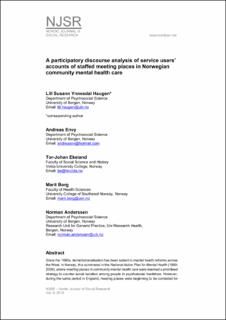| dc.contributor.author | Ynnesdal Haugen, Lill Susann | |
| dc.contributor.author | Envy, Andreas | |
| dc.contributor.author | Ekeland, Tor Johan | |
| dc.contributor.author | Borg, Marit | |
| dc.contributor.author | Anderssen, Norman | |
| dc.date.accessioned | 2023-01-09T19:14:29Z | |
| dc.date.available | 2023-01-09T19:14:29Z | |
| dc.date.created | 2018-03-27T08:08:36Z | |
| dc.date.issued | 2018 | |
| dc.identifier.citation | Nordic Journal of Social Research. 2018, 9 13-30. | en_US |
| dc.identifier.issn | 1892-2783 | |
| dc.identifier.uri | https://hdl.handle.net/11250/3042102 | |
| dc.description.abstract | Since the 1960s, deinstitutionalisation has been salient in mental health reforms across the West. In Norway, this culminated in the National Action Plan for Mental Health (1999-2008), where meeting places in community mental health care were deemed a prioritised strategy to counter social isolation among people in psychosocial hardships. However, during the same period in England, meeting places were beginning to be contested for contributing to social exclusion. This is an inquiry of meeting places in Norway guided by the following research question: How do service users discuss their encounters with the spaces and people of meeting places? Situated in community psychology and participatory research traditions, we engaged in a participatory discourse analysis of four focus group discussions with 22 service users from meeting places. We detail and discuss four central discursive constructions of meeting places against the backdrop of a civil society identified as fraught with sanism that stigmatises and excludes service users: a compensatory public welfare arrangement positioning service users as citizens with social rights; a peer community positioning service users as peers who share common identities and interests; spaces of compassion validating service users as fellow human beings who are precious in their own right; and greenhouses facilitating service users to expand their horizons of possibility. This inquiry implies that meeting places could mean everything to the people who attend them by facilitating opportunities considered less accessible elsewhere in their everyday lives in a sanist civil society. | en_US |
| dc.language.iso | eng | en_US |
| dc.title | A participatory discourse analysis of service users’ accounts of meeting places in Norwegian community mental health care | en_US |
| dc.type | Peer reviewed | en_US |
| dc.type | Journal article | en_US |
| dc.description.version | publishedVersion | en_US |
| dc.source.pagenumber | 13-30 | en_US |
| dc.source.volume | 9 | en_US |
| dc.source.journal | Nordic Journal of Social Research | en_US |
| dc.identifier.doi | 10.7577/njsr.2149 | |
| dc.identifier.cristin | 1575854 | |
| cristin.unitcode | 223,15,10,0 | |
| cristin.unitname | Institutt for sosialfag | |
| cristin.ispublished | true | |
| cristin.fulltext | original | |
| cristin.qualitycode | 1 | |
